Lesson 3
新概念英语第一册(Lesson3)学习笔记-全
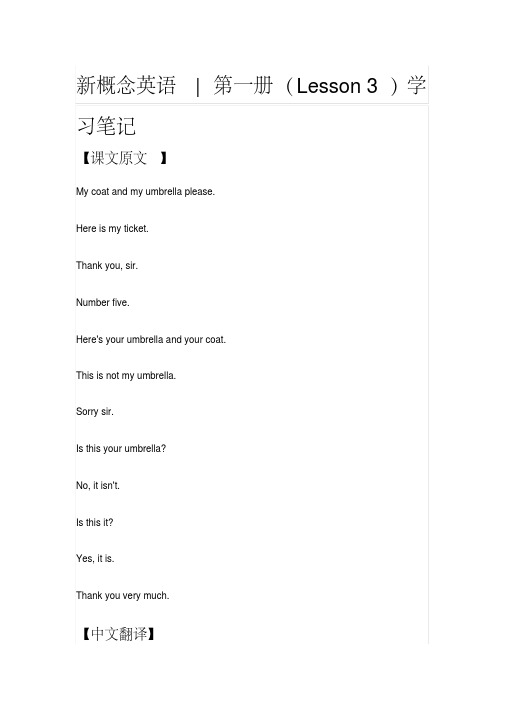
【课文原文 】
My coat and my umbrella please. Here is my ticket. Thank you, sir. Number five. Here's your umbrella and your coat. This is not my umbrella. Sorry sir. Is this your umbrella? No, it isn't. Is this it? Yes, it is. Thank you very much.
Here is my ticket
正常语序为:
my ticket is here.
例如:
Байду номын сангаас
Here is my father.
Here is my English teacher.
3.Thank you ,sir.
sir, 是英语中对不相识的男子、年长者或上级的尊称。在服务行业中,服务员对 男顾客的称呼通常为 sir:
【课文解析】
1 .My coat and my umbrella please. 请把我的大衣和伞拿给我。 这是一个省略形式的祈使句,完整的句子应为: Give me my coat and my umbrella, please. 口语中,在语境明确的情况下通常可省略动词和间接宾语, 如:(Show me your) Ticket, please. 请出示你的票。(Show me your)Passport, please. 请出示您的护照。 2.Here is my ticket. Here is =Here's Here is... 是倒装结构,即系动词提前到了主语之前。
新概念英语第三册:Lesson3重点句型解析

【导语】新概念英语⽂章短⼩精悍,语句幽默诙谐,语法全⾯系统。
适合各个阶层的⼈群学习参考。
相信有了新概念英语,你也可以成为“⼤神”级别的⼈物!还在等什么?快来加⼊学习吧!⼩编与您⼀起学习进步! 1、How did the archaeologists knowthat the statue was a goddess? Some time ago, an interestingdiscovery was made by archaeologists on theAegeanisland of Kea. some time 1>经过若⼲时间 2>在未来的某时 sometime adv.在某⼀时候,曾经, 有⼀天 sometimes adv.不时, 有时中⽂习惯⽤主动语态。
英⽂习惯⽤被动语态。
以事件、结果、影响、效果为主语,强调对客观事实的陈述。
An American team explored a temple which standsin an ancient city on the promontory of Ayia Irini. which引导定语从句,修饰限定temple。
(which = that) stand(不及物) = lie(不及物) 位于 =situate(及物) 使位于, 使处于 =locate(及物) 使...坐落于, 位于 whichstands in... = which lies in… = which is located in… = which is situated in... Stand 1>⾝⾼ 2>表⽰⾼⾼坐落于, 矗⽴于 -- She stands 1.75m. 她⾝⾼1.75 ⽶ --Agreattree stands on the mount. ⼀棵⼤树竖⽴在⼭上。
2、The city at one time must havebeen prosperous,forit enjoyed a high level ofcivilization. for引导原因状语从句:对主句的附加说明和解释,提供更多的信息。
新概念英语第一册课件lesson3
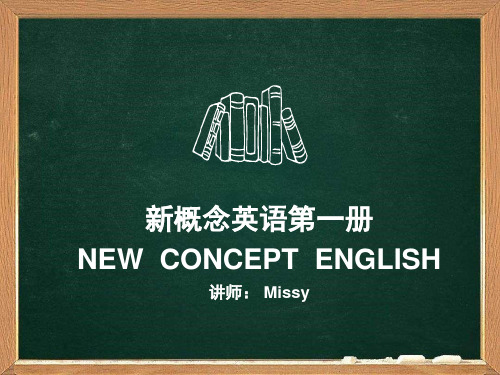
umbrella /ʌm'brelə/ n.伞
一把雨伞: an
umbrella
a /an 的用法
相同点:一...(件,把,张)
不同点:a 用于辅音音素开
头的单词前;an 用于元音音 素开头的单词前。
under the umbrella of......在...的保护下
eg.The boy is under the umbrella of the policeman. 男孩儿在警察的保护下。
This is my ticket.
This is not my ticket.
Is this it? Yes, it is.
it 在这里指代的是上文中的umbrella。 it 物它,可指事物,动物 he 他 指男性 she 她 指女性
Lesson 4 Is this your...?
单词讲解:
1. suit /su:t/ n.一套衣服 2. school /sku:l/ n.学校 3. teacher /'ti:tʃə/ n.老师 4. son /sʌn/ n.儿子(同音词sun) 5.daughter /'dɔ:tə/ n.女儿
Homework :
1.单词会读,会听写。 2.课文模仿语调大声朗读,并会背。 3.课本第7页对照图片练习对话。
Here is my ticket.
Here is my... 这是我的... eg: 这是我的钢笔。 Here is my pen.
my可以灵活运用哦 (his,her,your...)
Here's your umbrella and your coat .
=Here is 这里be动词采取“就近原则”
新概念英语 第一册 Lesson 3

字母u 或者o发[ʌ]
umbrella number sun up fun /funny lunch cover other
பைடு நூலகம்
cup bus shut much son money
[ʌ]
Well begun, half done. Well begun is half done. (良好的开始是成功的一半。)
小小绕口令
After dinner sit a while, after supper walk a mile.
单词重音
响亮的音节叫重读音节,不响亮的音节叫非重读音节或 弱读音节。如picture, 重读第一个音节,弱读第二个音 节。
读重读音节的时候,呼出的气流比较强,发音器官 的肌肉也比较用力,因此重读音节需要读得重而强;读 弱读音节的时候,胸腔肌肉用力小,呼出气流较弱。注 意;
the first picture.
[ə]
这是短元音,但发音长度并非是上一个的一半。 舌身平放,舌中部稍微抬起,但比前一个略低; 舌尖抵下齿龈;不要将双唇手圆了;发音时,唇、 舌和牙床都很自然,肌肉一点也不紧张;声带要 振动。
语音示范
er发[ə] worker teacher sister brother letter a发[ə] among about arrive along 其他发[ə] 的字母或字母组合 sugar doctor famous
英语中的每个单词在鼓励发音的时候都是有重音的。
因此,单音节词都要重读。
New words and expressions
Early bird catches the worm. 捷足先登
语音连接:巧分音节:一归后,二分开, 复印连缀不分开
新概念英语第一册 Lesson 3
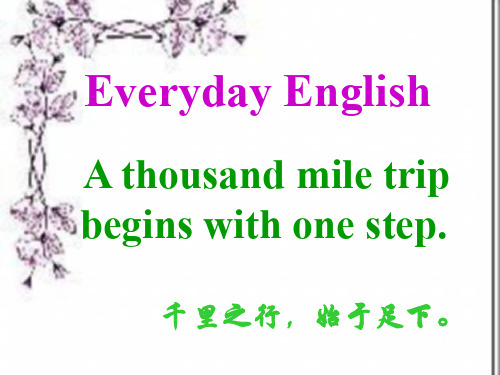
Write these with short forms :
Here is your pen . Here’s your pen . 1.Here is my ticket . 2.It is not my umbrella . 3.It is your umbrella . 4.It is my pen . 5.It is not my pen .
音标的学习
英语中的音标类似于汉语中的拼音,所 以学好音标后对英语单词的认读有很大 帮助。
音标简介 汉语中的拼音分为声母云母,而英文中
分辅音和元音。元音20个,辅音28个。 今天我们从简单的元音开始学习。
v
sunny lunch
duck but
[ ] jump fun
run hundred
一将那Isb般e是t疑动h问词她a句t提的。h前e含至车r有句吗cb首ea,动?r 句词?号的变陈问述号句,变用成升疑调问。句时, Yse, it is . No ,it isn’t .= No ,it is not .
Is this your umbrella ?
???
Yes ,it is .
那是你爸爸吗 Is that your father ? Yes , he is . No , he isn’t .
He has a daughter studying at harvard.
拉吉夫和索尼娅育有一子一女。
Rajiv and sonia had a son and a daughter.
伞 请 这里 我的 票 号码 五 对不起的 先生 衣帽
suit school teacher son daughter
Everyday English
lesson 3 课文翻译和词汇
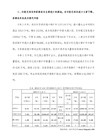
adversary ( n.) : person who opposes or fights against another;opponent敌手;敌方;对手 high-tail ( v.) :[colloq.]leave or go in a hurry;scurry off (chiefly in high-tail it )[口]匆忙离开,匆忙走开;迅速撤退;迅速逃走(主要用于high-tail it)
vacillation ( n.) :he state of wavering in mind;hesitation;indecision犹豫;踌躇 dally ( v.) :be slow or waste time闲荡;延误
bulge ( v.) :swell or bend outward;protrude or project膨胀,肿胀;鼓起,隆起,突出
unequivocal ( adj.) :not equivocal;not ambiguous;plain;clear不含糊的;不模棱两可的;明确的;明白的
新概念英语第二册 Lesson3 (共25张PPT)

• 3)decide / make up one’s mind 区 别
• decide 指经过考虑对疑难问题、争 端等做出决断,含有下决心取舍的 意思。decide 后常接动词不定式和 从句。
• make up one’s mind 指毫不犹豫的 做出决定,意味着“打定主意,下 定决心”。后常接动词不定式,一 般不接从句。
New words
1.send v. 送 派送 send sth. to sb. / send sb. sth 送给某人某物 nd a letter 寄信
send / take 区别: take 强调某人亲自送; take sth to sb 给某人送某物 send 则是通过第三人去送
与send搭配的常用短语
5.single 1)唯一的,单一的: 反义词 double
2)未婚的,独身的: 反义词 married 已婚的
• 6.postcard n. 明信片 卡片 • 有关card词组: • ID card身份证 • credit card信用卡
• 7.museum n. 博物馆 • 扩展: • the Palace Museum 故宫 • the Summer Palace颐和园 • the science museum 科学博物馆
现在进行时:
1.概念:表示现阶段或说话时正在发生的动作或行为。
2.结构:肯定句: 主语+ am/is/are + Ving + 其他. 否定句: 主语+ am /is/are +not + Ving + 其他. (1.在am/is/are后加not. 2.some → any)
一般疑问句:Am/Is/Are+主语 +Ving + 其他 ?
新概念英语第二册课文Lesson3
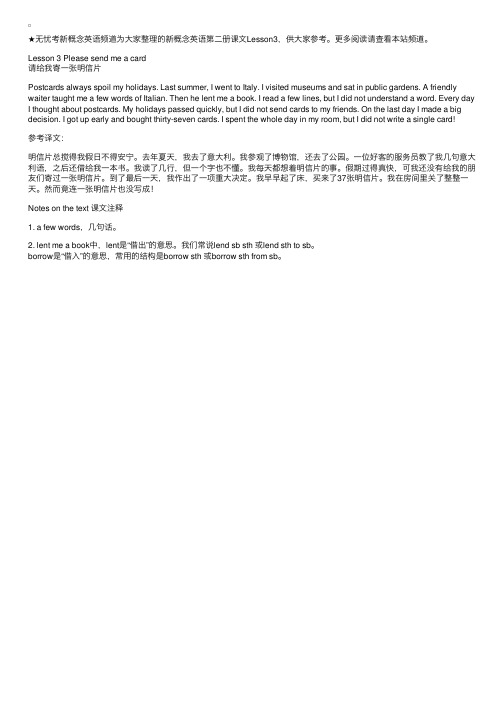
★⽆忧考新概念英语频道为⼤家整理的新概念英语第⼆册课⽂Lesson3,供⼤家参考。
更多阅读请查看本站频道。
Lesson 3 Please send me a card请给我寄⼀张明信⽚Postcards always spoil my holidays. Last summer, I went to Italy. I visited museums and sat in public gardens. A friendly waiter taught me a few words of Italian. Then he lent me a book. I read a few lines, but I did not understand a word. Every day I thought about postcards. My holidays passed quickly, but I did not send cards to my friends. On the last day I made a big decision. I got up early and bought thirty-seven cards. I spent the whole day in my room, but I did not write a single card!参考译⽂:明信⽚总搅得我假⽇不得安宁。
去年夏天,我去了意⼤利。
我参观了博物馆,还去了公园。
⼀位好客的服务员教了我⼏句意⼤利语,之后还借给我⼀本书。
我读了⼏⾏,但⼀个字也不懂。
我每天都想着明信⽚的事。
假期过得真快,可我还没有给我的朋友们寄过⼀张明信⽚。
到了最后⼀天,我作出了⼀项重⼤决定。
我早早起了床,买来了37张明信⽚。
我在房间⾥关了整整⼀天。
然⽽竟连⼀张明信⽚也没写成!Notes on the text 课⽂注释1. a few words,⼏句话。
- 1、下载文档前请自行甄别文档内容的完整性,平台不提供额外的编辑、内容补充、找答案等附加服务。
- 2、"仅部分预览"的文档,不可在线预览部分如存在完整性等问题,可反馈申请退款(可完整预览的文档不适用该条件!)。
- 3、如文档侵犯您的权益,请联系客服反馈,我们会尽快为您处理(人工客服工作时间:9:00-18:30)。
Lesson 3 Please send me a card请给我寄一张明信片First listen and then answer the question.听录音,然后回答以下问题。
How many cards did the writer send?Postcards always spoil my holidays. Last summer, I went to Italy.明信片总搅得我假日不得安宁。
去年夏天,我去了意大利。
I visited museums and sat in public gardens. A friendly waiter taught me a few words of Italian.我参观了博物馆,还去了公园。
一位好客的服务员教了我几句意大利语,Then he lent me a book. I read a few lines, but I did not understand a word.之后还借给我一本书。
我读了几行,但一个字也不懂。
Every day I thought about postcards. My holidays passed quickly, but I did not send cards to my friends.我每天都想着明信片的事。
假期过得真快,可我还没有给我的朋友们寄过一张明信片。
On the last day I made a big decision. I got up early and bought thirty-seven cards.到了最后一天,我作出了一项重大决定。
我早早起了床,买来了37张明信片。
I spent the whole day in my room, but I did not write a single card! 我在房间里关了整整一天。
然而竟连一张明信片也没写成!New words and expressions 生词和短语send (sent,sent)v. 寄,送postcardn. 明信片spoilv. (spoiled or spoilt) v.使索然无味,损坏museumn. 博物馆publicadj. 公共的friendlyadj. 友好的waitern. 服务员,招待员lend(lent, lent)v. 借给decisionn. 决定wholeadj. 整个的singleadj. 唯一的,单一的Notes on the text课文注释1 a few words 几句话2 lent me a book中,lent是“借出”的意思。
我们常说lend sb. sth.或lend sth. to sb.。
borrow是‘借入”的意思常用的结构是borrow sth.或borrow sth. from sb。
Lesson 3 自学导读First things first课文详注 Further notes on the text1.A friendly waiter taught me a few words of Italian. 一位好客的服务员教了我几句意大利语。
(1)虽然friendly是以-ly结尾,在拼法上与许多副词一样,但它却是形容词:He always greets me in a friendly way.他总是亲切地和我打招呼。
She gave me a friendly greeting.她友好地和我打了一下招呼。
He is not very friendly to John.他对约翰不太友善。
类似的形容词有:brotherly, fatherly, manly, lovely, motherly 等。
(2)a few可与复数可数名词连用,表示肯定,含有some, a small number of(一些,少数几个)的意思:The police would like to ask him a few questions.警察要问他一些问题。
Mother is coming in a few days.妈妈过几天就要来了。
2.Then he lent me a book. 之后还借给我一本书。
像send, buy, give等动词一样,lend可以有两个宾语:一个直接宾语(通常指物),一个间接宾语(通常指人)。
(cf. 本课语法)在这句话中,lend的直接宾语为a book,间接宾语为me。
Would you lend me your pen?能把你的笔借我用一下吗?Yesterday I lent my dictionary to Mary.昨天我把字典借给了玛丽。
3.…but I did not understand a word. ……但一个字也不懂。
not…a的否定意义比单用not要强。
课文的最后一句加了"single",语气更强。
4.Every day I thought about postcards. 我每天都想着明信片的事。
think about可以指某一段时间一直在想/考虑某事:I often think about the lovely holiday we had last year.我经常回想我们去年度过的愉快的假期。
What are you thinking about?你在想什么?I'm thinking about my friends.我在想我的朋友们。
5.make a big decision, 作出一项重大决定。
make/take a decision, 作出决定。
这是个常用的词语搭配,可以灵活使用:It was not easy for me to make/ take this decision.对我来说作出这项决定并不容易。
You have made/taken a wrong decision.你作出了个错误的决定。
Have you made/taken a decision?你决定了吗?6.I spent the whole day in my room…我在房间里关了整整一天……(1)spend与表示时间的词/短语连用时,意思为“花(时间)”、“度过”:We're going to spend three days in the country.我们打算到乡下去3天。
spend还可以表示“花钱”:If we spend all the money, we'll be poor again.如果我们把所有的钱都花光了,我们又会变穷的。
I can't spend any more on this car.我不能再为这车花钱了。
(2)whole表示“整整的”、“整个的”:a whole year一整年a whole bottle of milk一整瓶牛奶two whole weeks整整两星期语法Grammar in use1.一般过去时(The simple past tense) 与一般现在时上一课的语法提到一般现在时可以表示习惯性或经常性的动作。
在用一般现在时询问有关习惯的问题时可用ever。
一般过去时通常表示过去发生的而现在已经结束的事件、动作或情况。
它通常指动作何时发生,而不指动作持续多久。
因此,过去时与表明事情何时发生的状语连用是非常重要的。
Do you ever catch a cold in the winter?你冬天曾感冒过吗?Yes,I caught a cold last winter.是的,我去年冬天感冒了。
像last summer, last winter, last week, last night等这类状语只能与过去时连用,不能与现在时连用,因为它们确指过去的时间。
2.直接宾语(Direct object) 与间接宾语( Indiret object)许多及物动词后可以有两个宾语,直接宾语通常是动作所涉及的事物,间接宾语表示动作是对谁做的或为谁做的,通常是人。
这类动词有give, show, send, bring, lend, tell, return, write, pay, teach, make, buy, find等。
通常间接宾语在前,紧跟动词;不过,如想要强调直接宾语,也可将它置于动词之后、间接宾语之前。
这时,间接宾语之前则必须用介词to或for:I bought David a book yesterday.昨天我给大卫买了一本书。
I bought a book for David.我买了一本书给大卫。
Pamela sent Kate a letter last month.帕梅拉上个月给凯特写了封信。
Pamela sent a letter to Kate last month.帕梅拉上个月给凯特写了封信。
词汇学习Word study1.spoil vt.(1)弄坏,损坏,糟蹋:The sad news spoiled our weekend.这不幸的消息使我们没能过好周末。
The rain spoiled the school sports.这场雨把学校运动会弄得一团糟。
(2)宠坏,惯坏,溺爱:Julie loves her son too much. She has spoiled him. 朱莉太爱她的儿子了。
她把他惯坏了。
Don't spoil your children.不能太惯孩子。
2.public(1)adj. 公共的,公众的,社会的:There is a public library in this town.这镇上有一个公共图书馆。
I always sit in public gardens on Sundays.星期天我经常去公园坐坐。
(2)adj. 公开的,众人皆知的:Their secret meeting was made public 20 years later. 他们的秘密会晤20年以后才被公开。
(3)n.公众,群众,大众:The public is/ are pleased with his explanation.公众对他的解释很满意。
The museum is open to the public on Sunday.这家博物馆星期天对公众开放。
